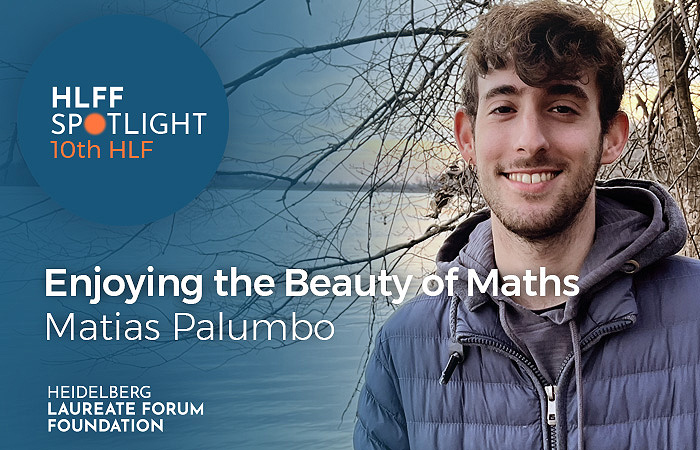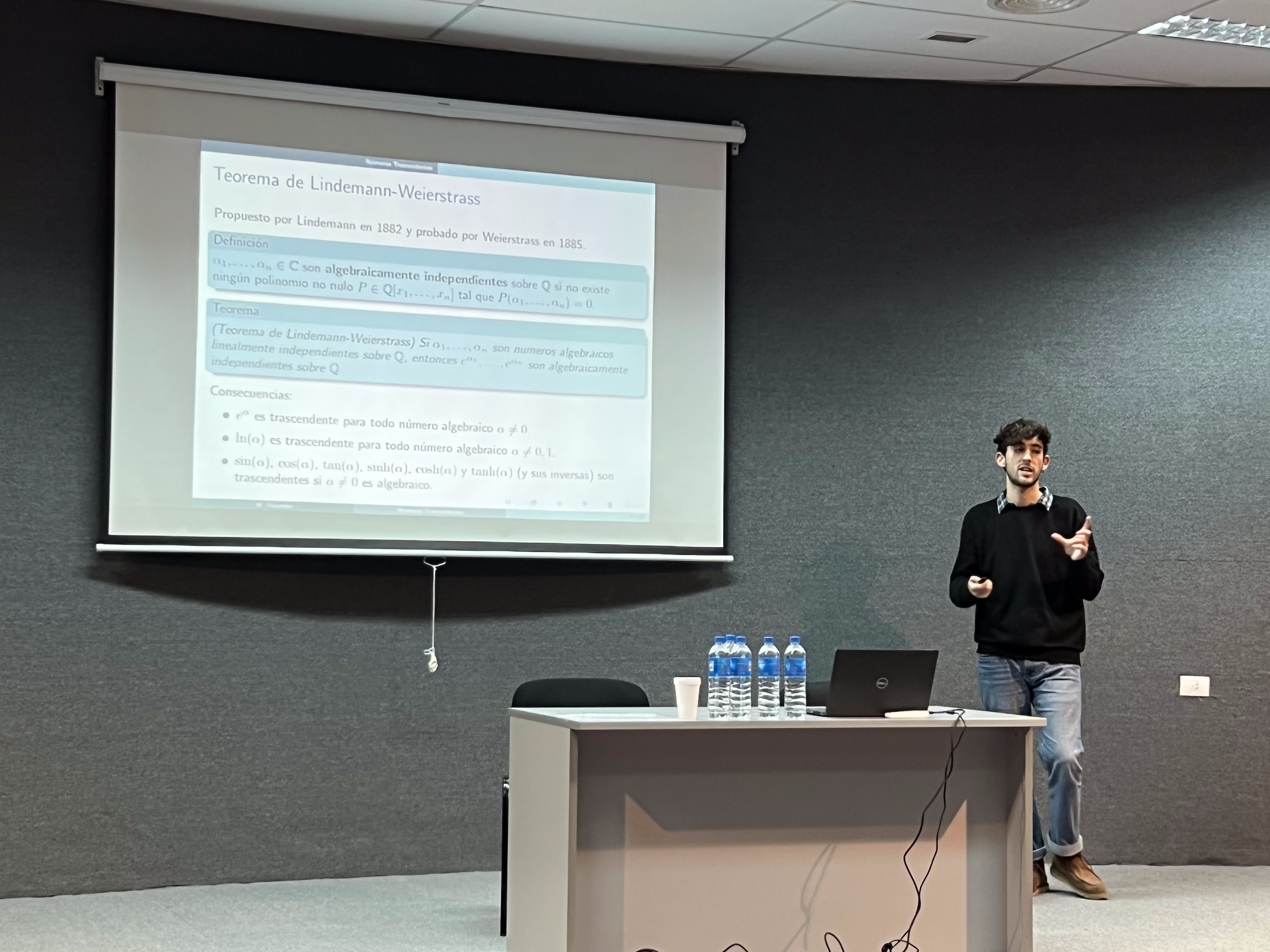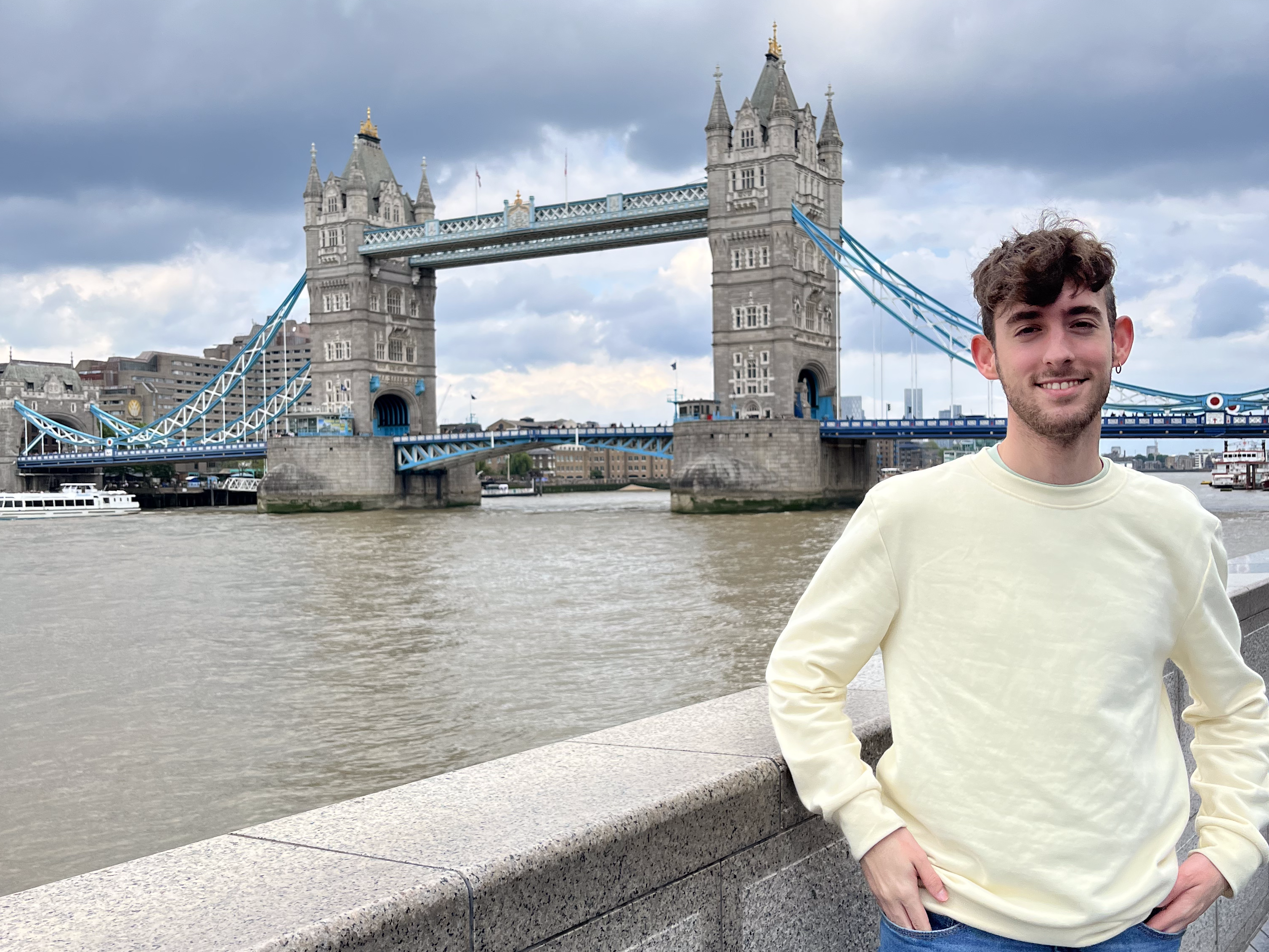HLFF Spotlight: 10th HLF
Engela Duvenage
Enjoying the Beauty of Maths – Matias Palumbo
The Heidelberg Laureate Forum has a single purpose: To provide some of the brightest minds in mathematics and computer science with the space and time to make connections and find inspiration. The HLFF Spotlight series shines a light on some of the brilliant young researchers attending the event, their background and research, as well as their expectations for the HLF.

To Matias Palumbo, mathematics is beautiful, and even artistic; rigorous and complex, yet also simple – and often-times all these descriptions at once. He is one of the 200 young mathematicians and computer scientists from across the world who will have the opportunity at the 10th Heidelberg Laureate Forum to learn from recipients of some of the most prestigious prizes in their respective fields.
Matias hails from Argentina – the same country as Luis A. Caffarelli, who in 2023 became South America’s first ever Abel Prize winner.
“It’s an incredible inspiration to know that someone from a city just four hours away from mine has received this highest possible honour,” the 22-year-old enthuses about the achievements of Caffarelli, who was born in Buenos Aires and is associated with the University of Texas at Austin in the USA.
For Palumbo, the city of Rosario in the province of Sante Fe is home. There he is working towards a Bachelor’s degree in the Department of Mathematics at the local National University of Rosario, after initially enrolling to study computer science.
In his own way, Matias has already made his mark on Argentinian mathematics. In 2022, he received the first prize in the National Monograph Contest of the Mathematical Union of Argentina. The monograph, titled “Transcendental Number Theory”, opened doors for him so that he could present his work at the Union’s annual national congress.
Also in 2022, he received a Friends of Fulbright 2022 scholarship from the Fulbright Association. It allowed him to participate in a seven-week cultural and academic exchange program at the University of Arkansas in the USA – an opportunity that not only proved to be valuable in terms of networking with peers from across the world and developing extracurricular skills, but which also allowed him to delve into historic or cross-disciplinary aspects of mathematics as part of weekly seminars presented by fellow students.
Mathematics undergraduate
 His undergraduate thesis work in functional analysis is part of a research project carried out in the French-Argentine International Center of Systems and Information Sciences (CIFASIS) inside Argentina’s National Science and Technical Research Council (CONICET). It focuses on the dynamics of linear operators and Hardy spaces of Dirichlet series.
His undergraduate thesis work in functional analysis is part of a research project carried out in the French-Argentine International Center of Systems and Information Sciences (CIFASIS) inside Argentina’s National Science and Technical Research Council (CONICET). It focuses on the dynamics of linear operators and Hardy spaces of Dirichlet series.
Matias sees a future in mathematics for himself and would one day like to pursue a PhD at a European university. This might even allow him to walk in the footsteps of another of his mathematical heroes, the 1700s Swiss mathematician Leonhard Euler.
“He was a very prolific, inspirational teacher, and I like the picture that has been painted of him in writings,” Matias says.
He explains the decision he took in his earlier undergraduate years to change course from computer science to mathematics as such: “It wasn’t that I didn’t like computer science any more; I just realised that I enjoyed mathematics more. I realised that what I wanted to do in the future had everything to do with mathematics. Like it was my calling.
“Maths is very exact and very rigorous, but it’s also very artistic in a way and very complex, yet often incredibly simple. It’s something I deeply enjoy. I can just sit for hours on end thinking about doing that. That’s something I truly enjoy doing,” he adds.
Many Interests
That said, Matias reckons others would be mistaken to box him into being a “pure mathematician”. That’s because so much of his evolving research interests, part-time work and outreach activities are linked to computer science, as well as his interest in programming and developing new ways of communicating science.
These broader interests and skills stand him in good stead as part of the Von Neumann Group, an initiative at his university under the leadership of HLF alumnus Dr. Demian Goos, who will also be attending this year’s HLF. The Group’s endeavours combine art and video games within the framework of different “rooms” to deconstruct different areas of mathematics, and to show how close it is to most aspects of everyday life. He hopes to one day have enough time to complete a “room” based on Mandelbrot fractal shapes.
As a teaching assistant at his home university, Matias tries his best to make aspects of Mathematical Analysis as understandable as possible to the first-year students whom he supports. Some of these ideas have found a home in his latest endeavour, a YouTube channel called Mathium. Matias describes it as part of “a college student’s efforts to make mathematics as interesting and visually compelling” as possible. The board game Monopoly, for instance, inspired a video that explains probabilistic models, and how to calculate a player’s chances of winning given the properties that they own or that they aspire to buy. To this end, he was inspired by Grant Sanderson’s mathematical YouTube channel, 3Blue1Brown.
Ambitions
Matias says he is ambitious and curious by nature. He is therefore keeping an open mind on what his future research field could be. He is – among other things – intrigued by the combined interdisciplinary practice of maths and computer science, and how the two fields support each other. To this end, he has worked as a support engineer for the payment software company Paddle since 2022, in charge of analyzing reports of discrepancies in the platform’s data and debugging potential errors in the codebase.
He is however by no means an “all work and no play” kind of guy. When Matias is not studying or working on maths related projects, he likes to read, play volleyball, and sing popular songs.
“And a fun fact is that I am one of a set of triplets,” Matias divulges.
And no, don’t even ask when you meet him at the 10th HLF: The triplets are by no means identical, as Matias has two sisters. One is studying to become a nurse, and the other is a fashion designer for a streetwear brand in Rosario.

The 10th HLF
The South American student is looking forward to what awaits him in Heidelberg: “From what I’ve gathered, I expect the 10th HLF to be an incredible experience. l believe that it will be eye-opening and very enriching to meet students and researchers from all around the world that are as passionate about their endeavours as I am.
“This year’s laureates are some of the brightest minds there are, and I know meeting them and engaging in conversation with them is going to be enlightening in many ways. I expect that not only will it be enriching to talk to them because of their trajectory, but it will also be inspiring to actually meet the people behind such achievements.”
There are three laureates with whom he’d especially like to rub shoulders.
“They are Vinton Cerf, who made incredible contributions towards building the foundations of the modern Internet; Sanjeev Arora, with whom I share the enthusiasm for developing the mathematics behind deep learning models and rethinking the traditional frameworks behind machine learning as a whole; and Leslie Valiant, who first introduced the Probably Approximately Correct (PAC) learning model which laid the theoretical groundwork for machine learning, and whose ideas I find deeply interesting.”
The post HLFF Spotlight: 10th HLF originally appeared on the HLFF SciLogs blog.